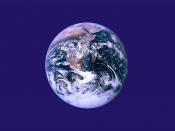The collective action of humans - developing and paving over the landscape, clear-cutting forests, polluting rivers and streams, altering the atmosphere's protective ozone layer, and populating nearly every place imaginable - are bringing an end to the lives of creatures across the Earth.
Extinction of biological species is not necessarily a phenomenon initiated by human activity, some argue. Although the specific role of extinction in the process of evolution is still being researched and debated, it is generally accepted that the demise of any biological species is inevitable. Opponents of special efforts to protect endangered species invariably point this out. They also suggest that the role of homo sapiens in causing extinction should not be distinguished from that of any other species. This position, most often espoused by individuals whose other views are curiously much more anthropocentric, is contrary to some well established facts. Unlike other creatures that have inhabited the Earth, human beings are the first to possess the technological ability to cause wholesale extermination of species, genera or even entire families of living creatures.
This process is accelerating. Wildlife management efforts initiated during this century have been unsuccessful in stemming the tide. Most public attention given to endangered species has focused on mammals, birds, and a few varieties of trees. Ecologists recognize a far greater threat to the much larger number of species of reptiles, fish, invertebrates, and plants that are being wiped out by human activity. In the past few decades, vast areas in several regions of the world have been cleared to make room for urban development or for food production. Modern agriculture techniques and industries' need for raw material have contributed to the epidemic of extinction.
During the last few centuries, growth in the human population and intensification of our use of resources...


